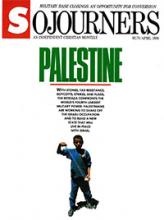The plea was painfully direct: "Please don't participate in killing kids."
After speaking articulately for more than an hour on the fine points of Israeli and international law, and after translating the stories of three young men just released from the wretched Ansar III prison, the eloquent Palestinian attorney wanted to give us this fundamental message to take home: "Don't participate in killing kids. We just want to live."
It was a message we had heard many times before, in Nicaragua, South Africa, and El Salvador. But to hear it again, from this person, in this place, was to hear it with new pain and compelling urgency. For in the West Bank and Gaza Strip, territories occupied by Israel, every day Palestinian children are killed, wounded, and imprisoned by the Israeli army, which is heavily subsidized by U.S. tax dollars.
We were 10 representatives of U.S. peace and justice organizations on a two-week fact-finding tour of Israel, the West Bank, and Gaza Strip. Co-sponsored by the Fellowship of Reconciliation (FOR) and the American-Arab Anti-Discrimination Committee (ADC), our delegation, which included Christians and Jews, had come to observe the realities of the Israeli occupation and the status of the Palestinian intifada, or uprising.
We arrived in the Occupied Territories at a time of great exhilaration and expectation, less than a week after the Palestine National Council had declared an independent Palestinian state. All the Palestinians we talked with were bursting with pride. Their intifada has radically altered the equation of the Palestinian-Israeli-Arab conflict.
Read the Full Article

